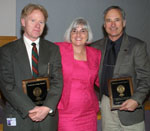Presidential Scholars, faculty honored for service, dedication
by Cindy AbolePublic Relations
As this year’s Presidential Scholars take their next steps towards becoming tomorrow’s leaders in health care, they also make way for a new class of eager student participants and faculty members. Two founding scholars faculty, David Graber, Ph.D. and George Tempel, Ph.D., will depart from their roles in May leaving their mark as facilitators and co-learners.
“The role of faculty in this program is so unique,” said Valerie West, Ed.D., associate provost for education and student life and director of the Presidential Scholar’s Program. “Both Dr. Graber and Dr. Tempel’s involvement has been crucial. They were both part of the original planning group and helped define the philosophy, goals and curriculum for the program. They have definitely left their mark on what has developed.”
 Drs. David Graber,
left, with Valerie West and George Tempel during Presidential Scholars
Day.
Drs. David Graber,
left, with Valerie West and George Tempel during Presidential Scholars
Day.Graber and Tempel were among nine faculty scholars, each representing six of MUSC’s colleges, who are selected to teach and interact with students in a challenging interdisciplinary learning experience. Faculty scholars serve for three year terms. Graber will be replaced by incoming faculty scholar Karen Wager, DBA, College of Health Professions. Tempel’s spot will be filled by Edward Soltis, Ph.D., professor and academic chair, Department of Physiology and Neuroscience.
Graber is an associate professor in Health Administration and Policy working in the College of Health Professions. A 1999 nominee of MUSC’s Health Sciences Foundation Teaching Excellence Award, Graber teaches organization theory and behavior, long-term care and health care ethics. His interests in curriculum development, critical thinking and program structure complement the interdisciplinary, collaborative experiences gained by faculty and students.
“From the start, I’ve worked with Dr. West and Scholar colleagues in planning and developing this program to become a meaningful experience for all participants,” said Graber. “I truly valued the interdisciplinary aspect of the program and enjoyed the opportunity to collaborate with MUSC faculty, as well as students.”
This year a group of scholars studied disparities in access to prescription drugs. Working in an interdisciplinary team with Graber, they generated educational materials from relevant Web sites, books, and literature and collected personal interviews for the purpose of improving the understanding disparities in access to drugs. This information is being prepared as an ongoing resource for current and future scholars. They also developed recommendations for change to improve the access to drugs by underinsured populations. The students shared their findings in a poster presentation during the Presidential Scholars Day recognition ceremony, April 13.
Tempel, a professor of physiology and neuroscience and assistant dean for the College of Graduate Studies, brought an enthusiastic and positive bearing to the Scholars program. A lifelong scientist and educator, Tempel relished in engaging in dialogues with students and co-faculty regarding research outcomes, activities, and discussions on a variety of disparity topics.
“The themes and topics engaged by our group were very complex areas to explore,” Tempel said. “It challenged the scholars and faculty to learn and understand the complexity of a variety of broad health care issues.”
Tempel is continually impressed how each scholars’ group has the potential to become future leaders in science and the health professions. A highlight of this year’s scholars experience was a trip to Columbia to visit the S.C. State Legislature and see the legislative process in action. The group observed legislative actions through forums and symposia. They quickly learned the value of legislative education, especially among health care professionals, and the need for active participation and development.
2005-06 Presidential Scholars
J. Ryan Altman, Walter N. Bennett III, Eric R. Buck, Alicia Carvajal, Jeffrey P. Cashman, Simone P. Chinnis, C. Rowena Devera, C. Desmond Donato, Jennifer H. Doobrow, Marcus Duvall, Adam L. Fernandez, Jejuan E. Gamble, Keisha Green, Kristen M. Hawthorne, L. Karen Hembree, Amanda Jackson, Muriel Labonte, Colin B. Ligon, Erika L. Manning, Ashley N. Miller, Melissa F. Minger, Danielle J. Moore, Benjamin Neely, A. Drane Oliphant IV, Mary C. O’Rourke, Anne-Marie Pages, John F. Payne, Shonda D. Peterson, Cristina Reyes, Va-Shondra Richmond, Leslie Robinson, Rachel Rosansky, John A. Ross, Shana Smalls, Mary Nicole Stroud, Mary Ann Timmerman, Marco A. Villegas, Christine A. Walters, James J. Weidel, Kimberly E. Westin, Jacquetta L. Williams, Corey J. Wright, John S. Yordy, and Kevin L. Youmans.
Friday, April 22, 2005
Catalyst Online is published weekly,
updated
as needed and improved from time to time by the MUSC Office of Public
Relations
for the faculty, employees and students of the Medical University of
South
Carolina. Catalyst Online editor, Kim Draughn, can be reached at
792-4107
or by email, catalyst@musc.edu. Editorial copy can be submitted to
Catalyst
Online and to The Catalyst in print by fax, 792-6723, or by email to
petersnd@musc.edu
or catalyst@musc.edu. To place an ad in The Catalyst hardcopy, call
Community
Press at 849-1778.